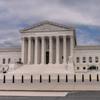In its final decision this term, the Supreme Court has ruled that President Biden does not have emergency authority under the HEROES Act to cancel up to $20,000 of student loan debt for borrowers. This decision, on the heels of yesterday’s ruling that curtails the use of race-conscious admissions, will reverberate deeply for millions of borrowers and families, and will make pathways to opportunity and financial security far more difficult—particularly for Black and brown families, women, and other systemically marginalized groups.
The Biden Administration’s plan, which would cancel $10,000 of student debt for all federal student borrowers earning under $125,000 and an additional $10,000 for former students who received Pell Grants, would be a transformative step for student loan borrowers, 20 million of whom would be debt-free. Despite the Court’s decision in this case, the Administration has many legal tools and authorities at its disposal to cancel student loan debt, many of which have regularly been used by administrations of both parties to reduce or eliminate the burden of loans. We strongly urge the Administration to use these tools broadly and quickly.
As this fight continues, it is vital to remember that the unrelenting rise in undergraduate student loan debt is directly related to the student basic needs crisis. Rising debt, in part, is the consequence of state and federal higher education policy decisions that have rendered the full cost of attendance unaffordable. At the same time that states have failed to invest the necessary funding to meet the demand for public higher education, federal policymakers have failed to increase Pell Grants at the level needed to reduce prices for low-income students. Meanwhile, our nation’s safety net and public benefit programs are rife with complex rules that prevent students from receiving aid that would help them pay for essential costs like housing, food, child care, transportation, and emergency expenses. Many of these retrograde rules are intentional, while others simply load up benefit programs with administrative burdens that make it nearly impossible for students to find, apply for, and enroll in benefits.
Despite the Court’s decision in this case, the Administration has many legal tools and authorities at its disposal to cancel student loan debt, many of which have regularly been used by administrations of both parties to reduce or eliminate the burden of loans. We strongly urge the Administration to use these tools broadly and quickly.

Mark Huelsman
Director of Policy and Advocacy at The Hope Center
As a result of the rising price of higher education and the daily burden of basic needs, too many families are priced out of an education, or take on far more debt than should ever be necessary for a degree or credential. In particular, canceling student loan debt will provide much-needed relief to millions of Black and brown borrowers, who are far more likely to experience high and runaway student loan balances, and who are far more likely to experience food and housing insecurity while enrolled in school. What’s more, canceling student loan debt is one step forward in repairing the woeful racial wealth gap in a country where White households in which no one has attended college have accumulated substantially more wealth than Black families where the head of household has a bachelor’s degree.
It is beyond time for federal and state policymakers to meet the moment and reduce the financial burden of higher education, particularly for those who otherwise may end up with decades of burdensome and unpayable debt. Doing so will require a holistic approach to college affordability that pairs reductions in tuition and non-tuition expenses with reforms to federal programs like SNAP, federal housing and child care programs, and federal financial aid programs that make it easier for students to get the support they deserve. While there has been a growing recognition that basic needs insecurity and non-tuition costs are a key reason why students take on debt or drop out due to cost, federal investment in students’ basic needs has a long way to go.
Canceling student loan debt is one step forward in repairing the woeful racial wealth gap in a country where White households in which no one has attended college have accumulated substantially more wealth than Black families where the head of household has a bachelor’s degree.

Mark Huelsman
Director of Policy and Advocacy at The Hope Center
This week’s shameful decisions at the highest court underscore the work ahead in building an economy and higher education system that lives up to our ideals of fairness, justice, and equity. For far too long, when families fall behind on student loans, when students cannot afford the cost of college, or when disparities in college access and attainment widen, lawmakers have treated their experiences as individual failings, rather than signs that our policies need structural and fundamental reform. But this is, and has always been, a crisis of political will rather than a lack of solutions. We look forward to the hard work ahead.


